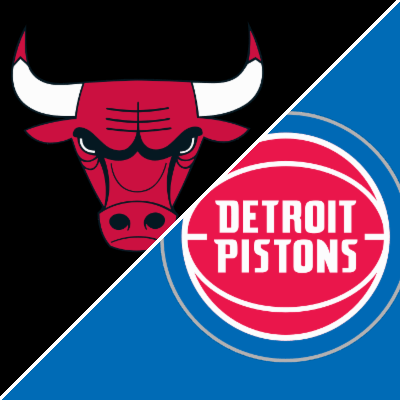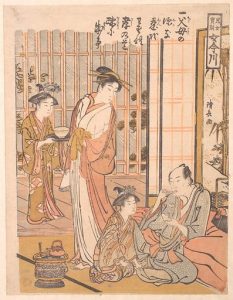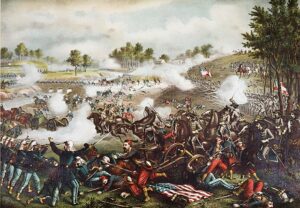They were known as the “Bad Boys”. The Detroit Pistons rose to power in the Eastern Conference of the National Basketball Association during the 1988-89 season. Thanks to their talent, toughness, aggressiveness, and swagger they took the Association by storm. But that had not stopped Chicago Bulls’ star, Michael Jordan, from lighting them up for 59 points in a single game that year, and 61 points in a game the year before, and the the Bulls won both games. Furious, Detroit Pistons’ head coach Chuck Daly vowed to find a way to stop Michael Jordan. His resulting game plan became known as the “Jordan Rules”.1

Equal parts mystique and reality, the underlying premise of the Jordan Rules were simple: make certain Jordan never got into a rhythm and try to exhaust him. When the Pistons had the ball, they would give it to whomever was being guarded by Michael Jordan. This was as good as wasting a possession and giving the ball back to the Bulls – Jordan was the reigning League MVP and Defensive Player of the Year – but to the Bad Boys, it was worth it to try and exhaust Jordan as much as they could so he could not carry the Bulls on offense.

When the Bulls were on offense, the Pistons would put their best defender on Jordan, and whenever Jordan went to the rim, the Piston defender would try and hit Jordan as hard as he could. “But when Jordan went by him, the real Rules were activated — knock the living hell out of Jordan when he drove to the rim. If he elevated — as he was wont to do — knock him out of the sky. Pound him. Punish him. Wear him down.”2
This was effective because Michael Jordan was the be-all and end-all for the Bulls. Everything they did ran through him. Their plan for crunch time? They did not have one. It just meant it was time for what was termed the “Archangel Offense”, after the Archangel Michael. The Chicago Bulls head coach Phil Jackson’s approach was “That’s where we give the ball to Michael Jordan and say, ‘Save us, Michael’ ”.3

Jordan, of course, was the best player in the NBA at the time, and the best in NBA history, so the Archangel Offense was not a bad idea, but it did leave them vulnerable to tactics like the Jordan Rules. The plan tried to overcome the Bulls by focusing on Jordan and making someone else beat them – they were happy to take their chances with someone else having the ball.
In 1988-89, the Bulls experimented by having Jordan play out of position at point guard to help counter the focus on him by letting Jordan involve his teammates more while letting him get more rest.4 The Bulls promptly steamrolled opponents with Jordan running the show and made it to the Eastern Conference Finals for the first time in Jordan’s career, before they ran aground against… the Detroit Pistons.

The Pistons, for their part, were happy to have Jordan initiating the offense for the Bulls. Pistons star Isiah Thomas and fellow guard Joe Dumars made a suggestion to their coach “Let’s not let Jordan beat us again. Let’s take a chance on letting their other guys beat us instead”.5 And it worked – using the Jordan Rules, the Pistons dispatched the Bulls and went on to winning the Pistons’ first-ever NBA Title. With their triumph over the Bulls, the focus on the Bad Boys and the Jordan Rules exploded, and its reputation grew into a myth larger than life. It actually turned into a psychological ploy as well. Pistons forward, Rick Mahorn, later said of the importance of the media focus on the ‘Jordan Rules’: “We were just throwing stuff out there. It was just a joke. Chuck throws it out there that we had some [top] secret plan to stop Jordan, and everybody just jumped on it. Everybody was writing stories about this strategy. When we kept reading about it, Isiah [Thomas] told us that we had gotten in their heads, and that’s how we had them beat.”6
In the season of 1989-90, Phil Jackson tried to prepare his team for the Jordan Rules. Still smarting after their Playoff series loss to the Pistons, he instituted the ‘Triangle Offense’. The idea was that all five players would be staggered around the floor in a certain way with three of them in the shape of a triangle, allowing for whoever had the ball to pass to any of his teammates and create ample opportunities for space to operate and involve others.

Once again, the Bulls piled up the wins in the regular season, finishing as the team with the second best record in the East, behind their longstanding rival, the Detroit Pistons. The two teams met in the Eastern Conference Finals rematch, where the Bulls pushed the Pistons to the brink, but lost a hotly contested Game 7 on the Pistons home floor, and the Pistons went on to win their second consecutive Championship. Encouraged by just how close they had come, Jackson had the Bulls double down on the Triangle Offense… and the next year, in 1990-91, the Bulls finally broke through.
That year, the Bulls finished in first place in the Eastern Conference, guaranteeing themselves home court advantage throughout the playoffs. For the third year in a row, the Bulls and Pistons played to determine who would represent the Eastern Conference in the NBA Finals, but this time, things were different. With an additional year of experience mastering the Triangle Offense, and with a strong supporting cast that could make opponents pay for focusing solely on Jordan, Jordan and the Bulls swept the Pistons in four games. Led by Isiah Thomas however, in a stunning display of bitterness and poor sportsmanship, most of the Pistons team walked off the floor with only a few seconds to go, so they could avoid congratulating the Bulls in a show of disdain and defiance. Only two Pistons shook hands with the Bulls once the buzzer sounded. While Thomas’ legacy as an NBA Hall of Famer is tarnished by this episode, he admitted he regretted his decision. When asked if he would do things differently if he could, he was quick to respond. “Absolutely. Looking back, in terms of what has happened, had I a chance to do it all over again, I would take the high road.”7

The Bulls dynasty and the Pistons would never meet again in the playoffs. The Bulls went on to win six NBA Titles in eight years, including two separate threepeats, interrupted only by the two years of Michael Jordan’s brief retirement before he returned. Micheal Jordan became universally acknowledged as the greatest NBA player of all time in the wake of the Bulls’ breakthrough, and became hugely influential in everything from shoes to logos.

The Pistons started to decline as their key players either left or retired, and have never made a Conference Finals since. Phil Jackson went on, in addition to his six titles as coach of the Bulls, to win five more titles as head coach of the Lakers using his Triangle Offense. While the rivalry between the Bulls and the Pistons burned bright and consumed the NBA, its fierceness is belied by the short time frame of its existence, only a few years in length. Yet, even now, the phrase “Jordan Rules” is still in the public mind, and the Bulls/Pistons rivalry remains one of the most famous episodes in NBA history.8
- Jack McCallum, “Mission Impossible,” November 1989, Sports Illustrated, https://vault.si.com/vault/1989/11/06/mission-impossible-no-one-shuts-down-michael-jordan-but-the-champion-detroit-pistons-have-developed-an-intricate-defensive-system-called-the-jordan-rules-that-comes-close-to-containing-him. ↵
- David Aldridge, “Bad Boys, Jordan Rules, Mariah, and More: These Palace Memories Will Endure,” November 2016, NBA.com, https://www.nba.com/article/2016/11/28/morning-tip-best-memories-palace-auburn-hills-detroit-pistons. ↵
- Harley Tinkham, “Bulls Have a Play for When It’s Beyond ‘Hail Mary’ Time,” May 1990, Los Angeles Times, https://www.latimes.com/archives/la-xpm-1990-05-28-sp-109-story.html. ↵
- Dan Devine, “How the Point-MJ Experiment Foreshadowed the Modern NBA,” March 2020, The Ringer, https://www.theringer.com/nba/2020/3/11/21174817/michael-jordan-triple-doubles-1989-chicago-bulls. ↵
- Chicago Tribune Staff, The Chicago Tribune Book of the Chicago Bulls: A Decade-by-Decade History, (Evanstown Illionois: Agate Midway, November 2016), pg 17. ↵
- “Chicago Bulls and Detroit Pistons Rivalry,” October 2009, Sportstalkline.com, https://directory.sportstalkline.com/sport/514157/chicago-bulls-and-detroit-pistons-rivalry-2-2/. ↵
- NBA TV, “Isiah Thomas Regrets ’91 Walkoff Against Bulls,” October 2013, NBCChicago.com, https://www.nbcchicago.com/news/sports/chicago-bulls-detroit-pistons-isiah-thomas-michael-jordan-nba-playoffs/1964192/. ↵
- Alonzo Warond, “Top 10 NBA Rivalries of All-Time,” April 2017, FadeawayWorld, https://fadeawayworld.com/2017/04/19/top-10-nba-rivalries-of-all-time/. ↵



34 comments
Eugenio Gonzalez
Michael Jordan Chicago Bulls against the ”Bad boys” Detroit pistons is a rivalry that an NBA fan enjoys as it was the only obstacle preventing Michael Jordan from reaching the pinnacle of the NBA. I like how the author talks about the triangle offense and how it helped the Bulls win. The author uses a quality image to give the reader an idea of how it operates.
Kensley Dieckow
What a great article. I watched the documentary “The Last Dance” about Micheal Jordan and the Bulls team, and you captured this rivalry perfectly. Everyone knew at the time that Jordan was the best but the pistons weren’t gonna go down without a fight. You put into perspective what was going through the Pistons minds during this series and you have to give them credit for adapting their game to the Bulls teams weaknesses. Great storytelling!
Madeline Bloom
Michael Jordan is an idol to many young athletes in the world. This was as good as wasting a possession and giving the ball back to the Bulls – Jordan was the reigning League MVP and Defensive Player of the Year – but to the Bad Boys, it was worth it to try and exhaust Jordan as much as they could so he could not carry the Bulls on offense. Jordan, of course, was the best player in the NBA at the time, and the best in NBA history, so the Archangel Offense was not a bad idea, but it did leave them vulnerable to tactics like the Jordan Rules.
Peter Alva
I love basketball for this stories like this. “This person was too good we had to do something” when one person on the court cannot guard you the only thing they can do is foul you. Being fouled over and over again although annoying and scary, to say the least (no one wants to get injured) is almost a compliment for it to happen to you but it’s what the pistons had to do to make sure they would win the game. Winning the game by any means necessary only proves who really wants to win it and the Bad Boys were willing to take the measures to ensure their 2 championships. although it came with some beef off the court it also came with some great basketball and only made Michael Jordan a better player.
Alvaro Garza
It’s no secret that Michael Jordan was a problem on the court. Being 19 years old, I never got a chance to experience the Jordan era, but I have witnessed his greatness through highlights and documentaries. The Piston-Bulls Rivalry was one of a kind and I hope I get to see something similar. With that being said, I think we are experiencing something similar with Lebron James and what he’s done for the NBA and the teams he has played for and in turn the rivalries he’s created. Well written article and exciting topic!
Joshua Buske
I learned a lot about this rivalry from the Netflix documentary “The Last Dance” and how these two teams legit hated each other on and off the court because of what has been said off the court and the stuff that has happened on the court. Jordan of course was the key to Phil’s offense, but Phil had a new type of offense no one in the league has run before which was the triangle offense. This type of offense is highly successful because there is always a player open in the sequence. Playing the “Bad Boys” of the Detroit Pistons Jordan and the Bull’s offense ran the triangle offense perfectly and the outcome of that is that the Bulls won due to everyone participating through the offense they were running.
Haik Tatevosyan
Hi,
I love this article because I play basketball myself and found it really interesting. I along with others did not know the offense was called the archangel offense. I feel like the Pistons did a great job to beat the best in the business using teamwork and toughness. Nothing came easy to them. They had to play very physical, a level that most weren’t willing to do and that’s why they won the championship.
Aticus Ovalle
Thinking of how far they were willing to go just to prevent such a good opponent from scoring really opens my mind toward how much the game has changed these days; it’s hard to even wrestle for a loose ball without having some type of foul called. The Pistons wanted no more disrespect from Jordan so I can understand the frustration, but to see Jordan take it personally and bring his play to the next level inspires me to always go beyond.
Juan Asfura
The 1989 and 1990 Detroit Pistons were one of the best teams the NBA has seen, and changed the NBA in a few aspects. For example, when they started to be the “Bad Boys” they were basically exploiting the rules in the league, by making hard hits on players especially Michael Jordan. Now, the NBA has many rules in order that teams can’t play like the Pistons used to. Foul calling is one of the things many players keep complaining about since it limits the things they can do on defense. The NBA veterans and Hall of Famers keep calling the present NBA “soft” especially because fights don’t happen as often as they did before. There is one thing you are mistaken in your article, you said the Detroit Pistons had never reached a conference final or a final ever since the Bad Boys were stopped.But the Detroit Pistons actually won a championship in 2004 with one of the most underrated teams in NBA history. Some players where Chauncey Billups, Rasheed and Ben Wallace, and Richard Hamilton. The funny thing is that team actually still had a “bad boys” in their blood, when they started one of the biggest fights any sport has ever seen, called the Malice at the Palace. I will always be a big fan of Michael Jordan and everything he has accomplished but the Detroit Pistons are one of my favorite teams.
Marvin Barnes
I think the pistons game plan against Jordan speaks volumes to how transcendent of a basketball player he was. The pistons had a better chance of winning the game by putting all of their energy and focus into one man than the other 4 players on the Bulls. They’d rather make someone else beat them and going up against Jordan, that’s practically your only choice. Jordan was still dominant when experimenting at point guard, but I think he reached his full potential when Phil Jackson implemented the triangle. It was the perfect balance of Jordan being dominant on the ball, while also getting his teammates involved. Once they had that system perfected the rest is history. The Bulls are one of the most prestigious franchises in sports and Michael Jordan is immortalized as one of the greatest players that has ever lived.